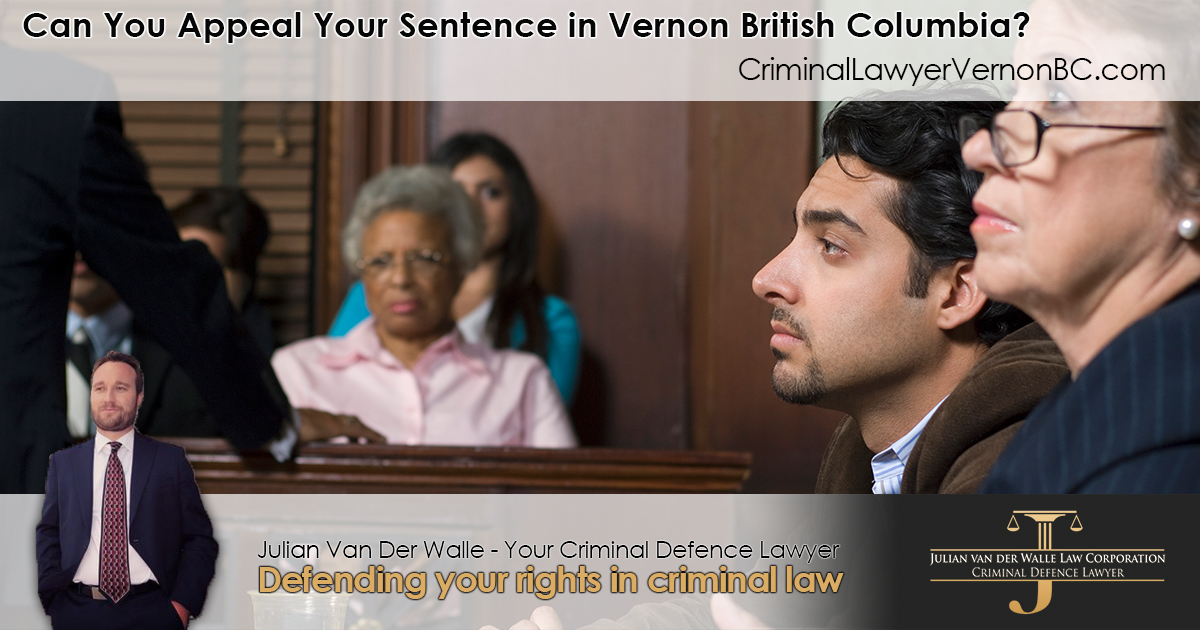Can You Appeal Your Sentence in British Columbia?

The Appeals Process Explained
For many criminal defendants, the appeals process is understandably confusing and difficult to navigate, especially without an attorney. The first thing to know is that you cannot appeal your criminal sentence if more than thirty days have passed since sentencing. The deadline may seem harsh, but it is intended to ensure that all appeals are fresh in the record so that no mistakes are made as time passes.
Many criminal trials in British Columbia begin in the Provincial Court. An adverse ruling in the Provincial Court can be appealed to the British Columbia Supreme Court. And finally, an adverse ruling in the British Columbia Supreme Court can be appealed to the British Columbia Court of Appeals.
During the appeal, no new evidence about the facts surrounding the case can be presented for the appellate judges to consider. Rather, the appellate judges will hear an argument from the Crown Counsel and either the defense attorney or the defendant about whether the trial conducted in the lower court was done properly. In limited cases, the appellate court may entertain evidence about errors that occurred in the lower court, but this is rare. For example, if the criminal defendant claims that the judge was playing a video game during the trial instead of paying attention, the appellate court would want to hear evidence about that claim. For questions, you should contact an experienced criminal defense attorney.
Situations Where an Appeal Would Be Appropriate
Before an appeal is sought, the criminal defendant must identify an appropriate basis for the appeal. While an appeal is a right granted to criminal defendants, each defendant seeking to appeal a sentence must provide a reason for the appeal. If the convicted defendant cannot provide a reason for the appeal, the appeal will be unsuccessful. Fortunately, however, several reasons allow for an appeal in a criminal case.
Be aware that appeals are focused primarily on errors of either law or procedure, not factual errors. This is because the appellate court will assume as a matter of law that the factual record developed in the trial court was correct. For example, in a drug possession case, the appellate court will not concern itself with a question of fact such as whether the drugs were found under the seat of a car or on top of the seat cushion. If the trial court determined that the drugs were found on the seat cushion, the appellate court will assume that determination was correct unless essentially zero evidence existed to prove that fact. Instead, the court will focus on legal questions such as whether the peace officer properly seized the drugs in accordance with the law or whether the evidence of the drugs was admissible at all.
With that understanding, there are many different types of legal errors that can be appealed. Generally, any alleged legal errors will have been made by the trial judge when he or she decided questions of evidence. Some common examples of these types of legal errors are: the judge’s decision whether or not to admit certain evidence; the judge’s responses to any objections made by the defendant or his/her defense attorney during the trial; objections to the gathering of any evidence; or objections about the fairness of the trial procedure itself.
Appellate Attorneys and Trial Attorneys Distinguished and Explained
Criminal defendants should also be aware that there is a separate category of attorneys who specialize in appeals cases. While most criminal trial attorneys have also argued appeals cases before, these specialized appellate attorneys are masters of appeals procedure and argument and can be very useful to hire when preparing an appeal. Generally, an appeals attorney will ask to work with the trial attorney on crafting an appeal so that the trial attorney can explain the nature of any errors that occurred. While hiring an appellate attorney can be useful, hiring an appellate can also be quite expensive. In most cases, your criminal trial attorney will be good enough to make an appeal, but if your case is very serious in nature (e.g.: murder charges, sexual assault charges, etc.) then you may also want to consider seeking out an appellate attorney.
Related Stories
Does drug addiction cause more crime?
Many in Canada often associate drugs with crime, and in many cases, the possession or use of drugs is itself a crime. More recently, a spotlight has been placed on drug-related incidents due to the opioid crisis afflicting the nation. Sociologists have spent...
Why You Should Hire a Vernon Criminal Defense Attorney
As a whole, the Canadian justice system is very fair. The accused enjoy the right to be present and be heard in court, the right to remain silent, and the right to representation by legal counsel. That last right is one of the most important rights of all. This...
Bad IRP Decision? What Can You Do About It?
Bad IRP Decision? What Can You Do About It? Drivers who are caught driving under the influence by the police may receive an Immediate Roadside Prohibition (IRP) on driving. An IRP is a temporary driving suspension that prevents the recipient from driving for a...
REQUEST A FREE CONSULTATION
Call 1.877.212.9645
Or fill out the form below to receive a free and confidential initial consultation.
